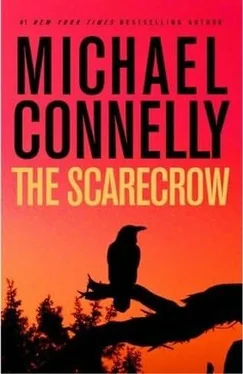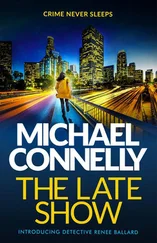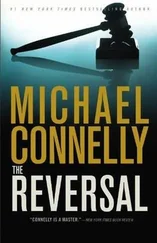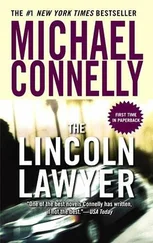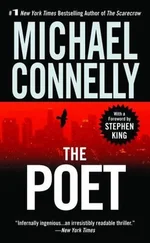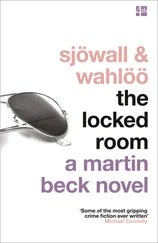Grossman took another ten minutes to finish giving out the details the department was willing to part with and then opened it up to questions. A couple of the television reporters threw him softballs, which he easily hit over the wall. No one asked him the tough question until I raised my hand. Grossman was scanning the room when he saw my hand. He knew me and where I worked. He knew he wasn’t going to get a softball from me. He kept scanning the room, probably hoping that another dimwit TV guy would put up a hand. But he didn’t get lucky and had no choice but to bring it back to me.
“Mr. McEvoy, do you have a question?”
“Yes, Captain. I was wondering if you can tell me whether you are expecting any backlash from the community?”
“Backlash from the community? No. Who complains about getting drug dealers and gangbangers off the street? Besides that, we had enormous support and cooperation from the community in regard to this operation. I don’t know where the backlash would be in that.”
I put the line about support and cooperation from the community into my back pocket for later and stayed on point with my response.
“Well, it’s pretty well documented that the drug and gang problems in the Rodia projects have been there for a long time. But the department only mounted this large-scale operation after a white woman from Hollywood got abducted and murdered going down there. I was wondering if the department considered what the community reaction to that would be when it went ahead with this operation.”
Grossman’s face got pink. He took a quick glance at the chief but the chief made no move to take the question or even help Grossman out. He was on his own.
“We don’t… uh, view it that way,” he began. “The murder of Denise Babbit only served to focus attention on the problems down there. Our actions today-and the arrests-will help make that community a better place to live. There’s no backlash in that. And it’s not the first time we have conducted sweep operations in that area.”
“Is it the first time you called a press conference about it?” I asked, just to twist him a little.
“I wouldn’t know,” Grossman said.
His eyes scanned the room for another hand from a reporter but nobody bailed him out.
“I have another question,” I said. “In regard to the search warrants evolving from the murder of Denise Babbit, did you find the location where she was allegedly held and murdered after her abduction?”
Grossman was ready for that with a pass-the-buck answer.
“That’s not our case. You will have to speak to Santa Monica police or the District Attorney’s Office about that.”
He seemed pleased with his answer and with stiffing me. I had no further questions and Grossman scanned the room one last time and ended the news conference. I stood near my seat, waiting for Angela Cook to work her way back from the front of the room. I was going to tell her that all I would need from her were her notes on the police chief’s comments. I had everything else covered.
The uniformed officer who had given me the handout at the door made his way to me first and signaled me to the door on the other side of the room. I knew it led to a side room where some of the equipment used in presenting the graphics during press conferences was housed.
“Lieutenant Minter wants to show you something,” the officer said.
“Good,” I said. “I wanted to ask him something.”
We went through the door and Minter was there waiting for me, sitting on the corner of a desk, his posture ramrod straight. A handsome man with a trim body, smooth coffee skin, perfect diction and a ready smile, Minter was in charge of the Media Relations Office. It was an important job in the LAPD but one that always confounded me. Why would any cop-after getting the training and the gun and the badge-want to work in media relations, where zero police work was ever done? I knew the job put you on TV almost every night and got your name in the paper all the time, but it wasn’t cop work.
“Hey, Jack,” Minter said to me in a friendly manner as we shook hands.
I immediately acted like I had called for the meeting.
“Hey, Lieutenant. Thanks for seeing me. I was wondering if I could get a mug shot of the suspect named Hicks for my story.”
Minter nodded.
“No problem, he’s an adult. You want any others?”
“No, probably just him. They don’t like running mug shots, so I probably will only be able to use one, if I’m lucky.”
“It’s funny that you want a photo of Hicks.”
“Why?”
He reached behind his back to the desk and brought around a file. He opened it and handed me an 8 × 10 photo. It was a surveillance shot with police codes in the lower right frame. It was of me handing Darnell Hicks the fifty dollars he had charged me in street tax the day before. I immediately noted how grainy the shot was and knew it had been taken from a distance and at a low angle. Remembering the parking lot where the payoff had taken place, I knew I had been in the heart of the Rodia projects and the only way the shot could have been taken was if it had been taken from inside one of the surrounding apartment buildings. I now knew what Grossman had meant by community support and cooperation. At least one resident in Rodia had allowed them to use an apartment as a surveillance post.
I held the photo up.
“Are you giving me this for my scrapbook?”
“No, I was just wondering if you can tell me about it. If you have a problem, Jack, I can help.”
He had a phony smile on his face. And I was smart enough to know what was happening. He was trying to squeeze me. A photo out of context like this could certainly send the wrong message if leaked to a boss or competitor. But I smiled right back.
“What do you want, Lieutenant?”
“We don’t want to stir up controversy where there isn’t any needed, Jack. Like with this photo. It could have several different meanings. Why go there?”
The point was clear. Lay off the community backlash angle. Minter and the command staff above him knew that the Times set the table as far as what was news in this town. The TV channels and everybody else followed its lead. If it could be controlled or at least contained, then the rest of the local media would fall in line.
“I guess you didn’t get the memo,” I said. “I’m out. I got a pink slip on Friday, Lieutenant, so there isn’t anything you can do to me. I’m down to my last two weeks. So if you want to send this picture to somebody at the paper, I would send it to Dorothy Fowler, the city editor. But it’s not going to change who I talk to on this story or what I write. Besides that, do the narcs down in South Bureau know you’re showing their surveillance shots around like this? I mean, this is dangerous, Lieutenant.”
I held the photo up so he could see it now.
“More than what it says about me, it says your drug team had a setup inside somebody’s apartment in Rodia. If that gets out, those Crips down there will probably go on a witch hunt. You remember what happened up on Blythe Street a couple years ago, don’t you?”
Minter’s smile froze on his face as I watched his eyes go over the memory. Three years earlier the police had conducted a similar peep-and-sweep operation at a Latino gang-operated drive-through drug market on Blythe Street in Van Nuys. When surveillance photos of drug deals were turned over to lawyers defending those arrested, the gang soon figured out what apartment the shots had been taken from. One night the apartment was firebombed and a sixty-year-old woman was burned to death in her bed. The police department didn’t get much positive media attention out of it and I thought Minter was suddenly reliving the fiasco.
Читать дальше
